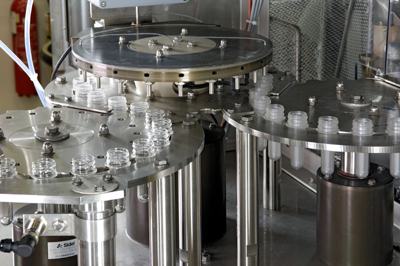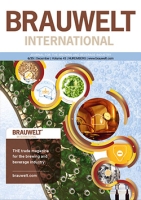Obviously, it’s not the water cascading down the Niagara Falls that finds its way into the bottles of the Niagara Bottling Co. But the choice of name was a clever one, symbolising as it does the power and purity of the American epitome for water as such. For Andrew Peykoff Sr., it was also instrumental in making the American dream of “milkman to millionaire” come true for himself and his family. Today, his son Andy Peykoff II is at the helm of the company, which with its corporate creed of high quality, low price, extraordinary service has boasted average annual growth rates of over 40 percent during the past ten years and is nowadays selling around five billion (5 000 000 000) fills a year.
Preliminary tests were conducted in order to develop a standard contamination, which can be used to analyse the mechanical effects of rinsing. These showed that a 70 % mustard ethanol suspension, dried slightly, is suitable to fulfil this task. In a systematic decision-making process, the conductivity measurement was selected as the method to determine the residual contamination. The performed measurement systems analysis confirmed the suitability of the used Conductometer for this measuring task. The design of the experimental plan as well as the evaluation and graphical display of the results was realized with the software Visual X-Sel® 10.0 in order to attain a large amount of information with a minor effort.
The Mauritius Brewery, located in Zwickau, Germany recently purchased new palletizers for use in their bottling plant. The contract for the new palletizing system was awarded to the equipment manufacturer Beyer based in Rosswein in Saxony. The new, high performance palletizing technology is described in detail below.
The globally operating Teka-Group including the companies Thielmann AG, Portinox S.A., FSB and Comet is expanding its keg sector. HW Brewery Services GmbH, whose core responsibility is keg-services takes charge of the fields keg and fitting maintenance, keg neutralisation and logistics in volume reduction on behalf of Teka. Since Teka has subsidiaries in England, Spain, Belgium and Austria and HW Brewery Service has offices in Benelux, Czech Republic, Bulgaria, Romania and Slovak Republic their customers have access to a region-wide service network.
Glass is the first choice food and beverage packaging material for German and European consumers. This is confirmed in a recent study commissioned by the Brussels-based Fédération Européenne du Verre d’ Emballage (Feve), the European Container Glass Federation, which was presented at an online press conference on 20 April. A total of 6,200 consumers in 12 European countries were surveyed in what is assumed to be one of the largest studies ever conducted by the packaging industry.
Combi Predis™ FMa is Sidel’s innovative, simple system for blowing bottles and filling sensitive products in aseptic conditions. The key feature setting the system apart from other equipment of the same type is its “dry preform technology”: bottle rinsing is replaced with dry preform sterilization at oven entrance, using hydrogen peroxide vapour (H2O2).
PET as an alternative | The primary purpose of packaging material for perishable goods is to serve as a suitable storage receptacle for the product while providing protection against all external influences to the greatest extent possible. It is also important that packaging is flexible, that it is able to be molded into a variety of forms and has versatile design potential, so that it can easily be modified to fit specific consumers’ needs. Due to their form and distinctiveness (e.g. color and design), plastic bottles provide almost unlimited packaging possibilities. This article traces important advances in PET technology, with an emphasis on the quality of the packaging materials.
Variety in Every Sense of the Word | Due to their numerous advantages, PET bottles continue to gain popularity both in Germany and internationally, especially in the non-alcoholic beverage segment. With beer, however, opinions differ from country to country. What types of beverages in which size of package consumers are willing to accept in PET bottles, and also which trends are on the horizon are discussed below.
PETnology Europe 2009 | “Connecting comPETence” was the motto of this year’s PETnology Congress, (PETnology GmbH, Regensburg), an annual conference devoted to all things PET. In keeping with this motto, organiser and Managing Director Barbara Appel invited experts from leading companies in marketing and technical fields to speak at the conference. This year, the PETnology conference was held on March 9 - 10, immediately prior to and in conjunction with the Anuga Foodtec in Cologne, Germany.
Identification of microorganisms (in this context yeasts from breweries) is an important task. Familiarity with foes, such as adaptable spoilage yeasts, and friends, brewers’ yeasts, is of major relevance in order to assess microbiological issues. In project B95 of “Wissenschaftsförderung der Deutschen Brauwirtschaft e. V.“, an established identification method, Fourier Transform Infrared (FTIR) Spectroscopy is used on yeasts from breweries. Investigations focus on both direct product-spoiling foreign yeasts, as well as indicator yeasts for assessment of the hygiene status of products and production facilities, together with top and bottom-fermenting culture yeasts.



